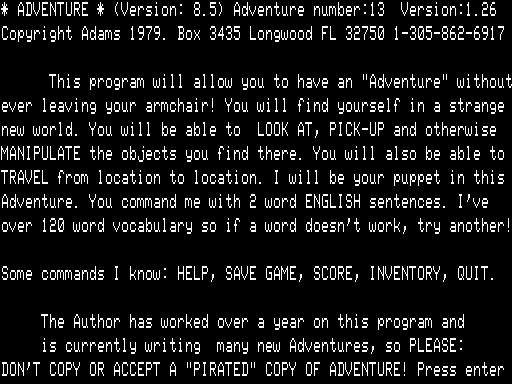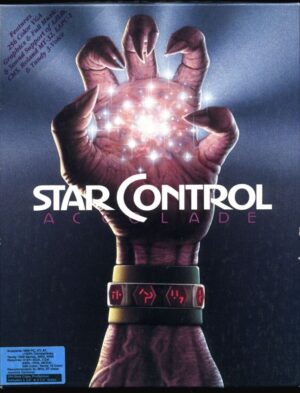Retro Replay Review
Gameplay
Sorcerer of Claymorgue Castle continues the classic Adventure SAGA formula with a familiar two-word parser that balances simplicity and depth. You’ll spend much of your time exploring interconnected rooms, gathering items, and solving logic-based riddles that often require both careful reading and experimentation. For veterans of earlier Scott Adams adventures, the command structure will feel intuitive, while newcomers will appreciate the gentle learning curve.
(HEY YOU!! We hope you enjoy! We try not to run ads. So basically, this is a very expensive hobby running this site. Please consider joining us for updates, forums, and more. Network w/ us to make some cash or friends while retro gaming, and you can win some free retro games for posting. Okay, carry on 👍)
Where Sorcerer of Claymorgue Castle really shines is in its creative use of magic. As the apprentice of Solon the Master Wizard, you learn and cast spells that are essential for bypassing obstacles, disarming traps, and even communicating with otherwise hostile creatures. These magical mechanics layer on top of the familiar “find item, use item” gameplay loop, keeping each new encounter fresh and challenging.
The game’s design encourages thorough exploration. Hidden passages, secret compartments, and cryptic runes dot the castle’s rooms, rewarding players who take notes or draw their own maps. Puzzles range from inventory-based puzzles—like combining the right reagent with a spell receptacle—to spatial challenges, such as navigating shifting corridors. This variety prevents the gameplay from ever feeling repetitive.
Difficulty ramps up in the latter half of the castle, where timing and resource management become crucial. Magic points are limited, and some spells require rare reagents that you must conserve for specific encounters. This layer of strategy adds tension: will you risk using your last dispel spell now, or hold out for a potentially deadlier threat deeper in the dungeon?
Graphics
Although Sorcerer of Claymorgue Castle belongs to an era known for text adventures, this 13th entry in the series marks the first time the game wasn’t released solely in all-text format on most platforms. On systems like the Commodore 64 and Atari, you’re treated to modest but charming static illustrations that depict key locations—such as the grand foyer, the torchlit corridors, and the mysterious spell chamber.
The pixel art is simple yet evocative, employing a limited palette to capture the mood of a crumbling castle filled with arcane energy. Each illustration appears when you enter a new area or trigger a major event, adding visual context to the text descriptions. While these graphics won’t rival RPGs of the time, they do enhance immersion and help orient you as you delve deeper into Claymorgue Castle.
On platforms like the BBC Micro, Electron, Dragon, and TRS-80, you’ll experience the classic text-only format. Here, the game’s prose and your own imagination take center stage. The vivid descriptions—of flickering torches, echoing chants, and the alluring glow of the Stars of Power—demonstrate Scott Adams’s knack for painting an atmospheric scene with words alone.
Across all versions, the user interface remains clean and responsive. Command prompts are clearly displayed, and text scrolls at a readable pace. There’s no fancy windowed UI; instead, you get a no-nonsense display that keeps you focused on exploration and puzzle-solving rather than navigating menus.
Story
The narrative thrust of Sorcerer of Claymorgue Castle is straightforward but potent: Solon the Master Wizard has lost the 13 Stars of Power, and as his apprentice, you must brave a treacherous stronghold to reclaim them. This setup provides a clear goal and a steady momentum that carries you from room to room, puzzle to puzzle.
Though the plot doesn’t feature branching arcs or multiple endings, subtle details and environmental clues hint at a rich backstory. Crumbling tomes, magically warded doors, and inscriptions in an ancient tongue suggest that Claymorgue Castle once served as a nexus for arcane research—and that something went terribly wrong. These breadcrumbs invite players to piece together the castle’s history even if they never encounter it directly.
The sense of progression is rewarding. Each recovered Star of Power thumps with magical resonance, visibly altering the atmosphere around you. When the final star is within reach, the tension culminates in a series of confrontations that test every spell you’ve learned, making the conclusion feel well earned.
Dialogue is sparse but purposeful. Interactions with summoned spirits, enchanted guardians, or the occasional fellow apprentice provide just enough flavor to underscore the wizardly theme without derailing the core adventure. The result is a cohesive story that strikes a balance between simplicity and imagination.
Overall Experience
Sorcerer of Claymorgue Castle stands out as a worthy addition to the Scott Adams Adventure series. It retains the tight puzzle design and classic parser of its predecessors while introducing more sophisticated magical mechanics and, on many platforms, atmospheric visuals. Whether you play a graphics-capable version or stick with the text-only release, the castle’s mysteries are equally engaging.
The difficulty curve strikes a satisfying balance: puzzles start accessible but evolve into clever, multi-step challenges that require planning and resource management. Occasional hints are embedded within the environment, so even if you get stuck, retracing your steps or revisiting earlier descriptions often reveals new clues.
For retro gaming enthusiasts, Sorcerer of Claymorgue Castle offers a nostalgic throwback to the golden age of text adventures, enriched with first-generation graphics and a magical theme that sets it apart. Its emphasis on exploration and experimentation makes each playthrough feel personal, as you chart secret passages and decide when to unleash powerful spells.
Ultimately, if you’re seeking a thoughtful, atmosphere-driven adventure that combines classic Scott Adams puzzle design with a wizardry twist, Sorcerer of Claymorgue Castle is a must-play. Venture forth, apprentice, and may your knowledge of runes and reagents guide you safely through the castle’s hidden depths.
 Retro Replay Retro Replay gaming reviews, news, emulation, geek stuff and more!
Retro Replay Retro Replay gaming reviews, news, emulation, geek stuff and more!









Reviews
There are no reviews yet.